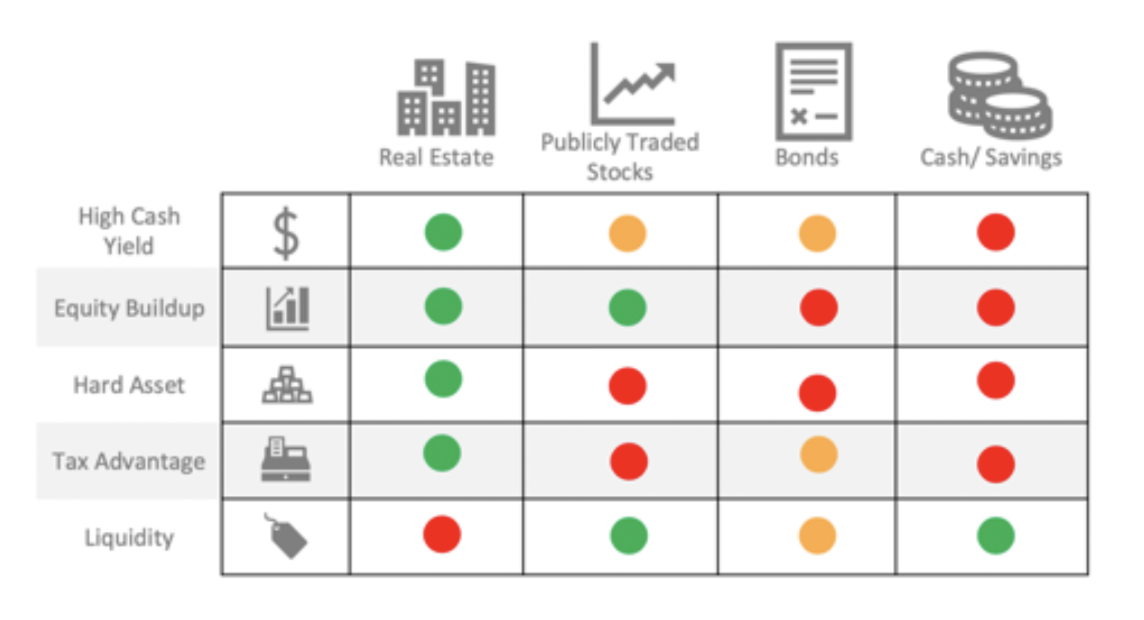1.0 – Preview of What is to Come
My advice to new investors
- Do not invest until you have been learning for at least 6 months
- Do not deploy more than 200k in first year if you net-worth is under 1-2M
- Only invest after finding 2-3 good personal relationships of peer investors (not marketers, syndicators, or salespeople)

The Wealthy vs Main Street vs Wall Street
It should be very clear to everyone by now that the wealthy invest very differently from the Main Street investor.
They zig when everybody else zags. That’s why they’re wealthy. Take for instance Main Street’s fascination with index funds. The wealthy couldn’t be bothered with them.
Main Street investors gravitate to index funds for their convenience and compared to mutual funds, their relatively inexpensive. For investors who don’t have the time or disposition to research and track individual stocks, index funds are appealing.
Index funds track the market fairly well and consistently beat actively managed funds like mutual funds and hedge funds. Why pay 9x the cost for expertise when the so-called experts rarely even beat the market?

So why do the wealthy ignore index funds?
They ignore index funds for the same reason they ignore most Wall Street investments: they’re not content to make “average” returns, they want to beat the market and save a lot of taxes in the process. I don’t go into the deal without an unfair advantage. Some would call this insider trading.
The wealthy look outside the box and venture into asset classes Main Street investors are hesitant to indulge in and frankly don’t have access; specifically, alternative assets available through private markets because they lack the relationships.
Private investments tend to be tagged “high risk” because higher-risk alternatives such as hedge funds and venture capital tend to get lumped with lower risk, less market-correlated assets like private debt and commercial real estate. However, the wealthy have learned to reduce alternative asset risk through various mitigating strategies to generate above-market risk-adjusted returns.
Allocation to Income Producing Assets
One of the mitigating strategies adopted by the wealthy is an allocation to income producing assets. Income-producing investments backed by hard assets don’t fit the traditional risk-reward paradigm.
High returns don’t necessarily translate to high risk with these types of assets. Because of the cash flow factor that increases returns over time from the compounding effect, it is actually possible to achieve high returns at a reduced risk because of the security offered by the underlying asset. This is particularly true for assets that thrive in a downturn.
Multi-Tiered Diversification
Another mitigating strategy the wealthy use is multi-tiered diversification. The problem with public equities is while diversification is achieved through acquiring multiple stocks across multiple industries to minimize risk in good times, no amount of diversification will save your portfolio in a market crash.
While diversification on Wall Street typically comes at the cost of returns as risk is reduced, diversification in the world of income-producing alternatives doesn’t necessarily mean reduced returns.
Multi-tiered diversification of alternative assets is less about lowering risk at the expense of returns and is more closely associated with creating multiple streams of income to preserve cash flow and appreciation.
The wealthy gravitate to income-producing alternatives because these assets lend themselves to diversification across a variety of variables including:
-
Minimizing PITA
No more managing tenants, vacancies, maintenance and the managing the manager (who is a $12-20 dollar employee who's compensation structure is not aligned with your goals). By passing the control of the day to day operations to true experts who are literally partners (direct alignment of compensation and motivations), you can assure the investment is being optimized while you spend your time on what you want which is 1) making more money at your day job, 2) spending time with your family or 3) finding that one off deal that you want to do one your own while pairing with a Limited Partner strategy (simplepassivecashflow.com/pita).
-
Asset Diversification
Many commercial real estate investments have high acquisition prices (think $10M+) where most people don't have access to. You want to get away from these other Mom and Pop investments like these 1-40 units. When I was a syndication newbie, I thought I could do everything by myself and did not trust anyone. I then realized in a few months that 1-40 unit deals had horrible pricing because all the amateurs were involved and the ones that looked good from a per unit price prospective were under 80% occupied and had ISSUES. Investing passively in a group can allow you to invest in multiple asset classes (apartment/mobile home/assisted living), in multiple locations and with varying business plan duration.
-
Avoid Credit and Liability Risk
Investing passively allows one to avoid being exposed to credit or liability risk. No W2 documented income no problem! You do not need to personally guarantee multi-million dollar loans and be the fall guy. Plus now you can get into all the travel hacking credit cards and tradelines you want (Simplepassivecashflow.com/tradelines).
-
Cash flow
The goal of a LP syndication investor is to create a "ladder" of investments that consistently bring cashflow and cash out at different times. It's like your grandpa's CD ladder strategy, but with 10-30x returns.
-
Taxes
All the deprecation benefits of single family home being your DIY direct investing but even better! Bigger deals are able to pay for a cost segregation to squeeze out even more depreciation. (simplepassivecashflow.com/costseg)
All of these factors serve to preserve one thing – income/cashflow – essential for growing and maintaining wealth even in the midst of turbulent times.
To achieve those above-market returns, wealthy investors are willing to give up liquidity. In fact, they welcome illiquidity because it prevents the type of volatility that destroys wealth on Wall Street (based on emotion).
That’s why 33% drops in the Dow like in the early days of the 2020 pandemic didn’t faze them. Not being heavily allocated to public equities means continued cash flow from insulated assets, assets found only in the private markets.
Wealthy investors willingly give up liquidity to achieve:
- Above-Market Returns
- Non-Correlation to Wall Street
- Consistent Income Stream
- Long-Term Growth
- Management Transparency
- Expert and Efficient Management
Standing still = going backwards
Robert Kiyosaki, author of Rich Dad Poor Dad, has a famous quote
“Savers are losers.”
Most savings accounts are barely giving any money back. You’re lucky to get 1%. Most people’s money is in the bank for less than the cost of inflation, which is 3%. They’re losing money by having their money sitting there. They’re basically paying the bank to hold onto their money.
Smart money is borrowing money at very low interest, and investing it in cash-flowing assets like real estate.
For example, you can borrow money at 4% and invest it in real estate giving you 12% per year. You’re netting 8% and making money off other people’s money.
That’s what smart people are doing. They’re not sticking their money in the bank. Savers are losers.”
[Now I am not a total fan of Mr. Kiyosaki since his book, although life changing, the offer is not tangible advice of the how, who, or what to do… I want to fill that void. Kiyosaki is essentially a brand ambassador of a rather large education company designed to have people (most of which don’t have money) pay $30,000-$60,000 for educational training where they should be putting that into actually buying their first investment.]
True wealth is not a number but is actually a measure of how much income your assets (investments) produce passively for you. This in turn affords you financial freedom. In our tribe… this is the freedom to do what you want, where you want, when you want, and with the people you want.
Welcome to Journey to Simple Passive Cashflow!
John is one who came through the Incubator Program and later graduated to the Mastermind
